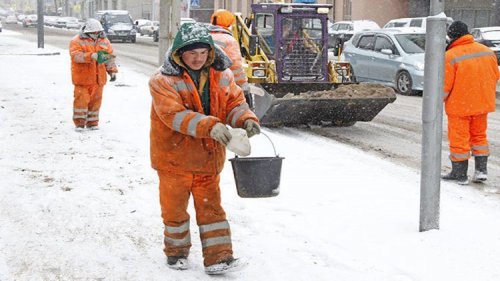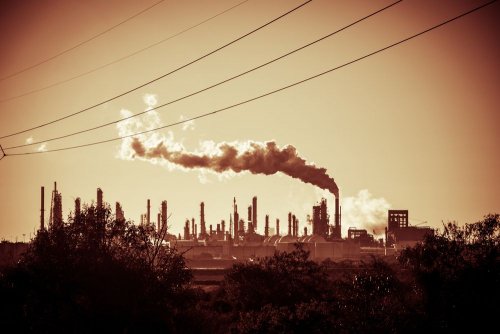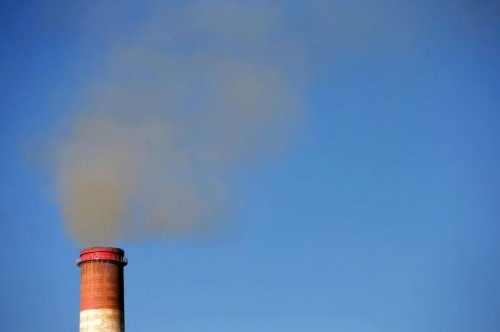Open environmental data is the key to our healthy and safe life. Their closure will cause irreparable damage to our health and the environment in general.
Now, effectively under the guise of a martial law security agenda, authorities are closing access to critical data to the public, limiting our ability to participate in decisions that directly affect each of us and are critical to civilian security, the report said. press release of a public organization Save Dnipro.
Why can't environmental data be closed?
The right to free access to environmental information is guaranteed by the Constitution of Ukraine and the obligations of the Aarhus Convention, which has been ratified by Ukraine. It is also provided by the Laws of Ukraine "On Environmental Protection", "On Information", "On Access to Public Information". The adoption of Resolution No. 835 of the CMU contributed to the improvement of access to environmental data, the owners of which are various authorities, since a third of the total part of the sets specified by this resolution, related to the environment, began to be published on the Unified State Web Portal of Open Data.
Environmental data in the open data format ensured the development of various digital products, including by the non-governmental sector, which provided citizens with convenient tools for access and participation. Such a product is Saveetsobot , which has almost half a million Ukrainian users and provides aggregated and organized information about environmental pollution and the factors that affect it.
Back in 2019, the team advocated for amendments to the CMU Resolution No. 835, where it included a number of lists of non-essential environmental data, which were later successfully adopted.
So, before a full-scale invasion began, every citizen had access to a wide range of data, such as:
- the list of permits for emissions of pollutants into the atmosphere by stationary sources of objects of groups 1, 2 and 3, indicating the number and validity period;
- the list of licensees for carrying out economic activities for the production of particularly dangerous chemical substances;
- the list of licensees for carrying out business activities related to the management of hazardous waste;
- the list of waste declarations submitted by business entities;
- a list of permits for special water use;
- information on receipt of environmental tax by individual taxpayers;
- information on the results of state supervision (control) in the field of environmental protection, etc.
What is happening now?
After the start of a full-scale invasion, within the framework of security measures, government authorities began to limit free access to various data sets. There was an alarming tendency to limit the rights and freedoms of citizens, which were not prescribed in restrictions and prohibitions of martial law.
We analyzed the issue of open "eco-data" and the situation regarding the prospects for changes in the 835 Resolution, which ensures the placement of relevant sets on the state portal. As a result - according to Notice of holding a public public discussion of the draft resolution of the Cabinet of Ministers of Ukraine "On Amendments to Resolutions of the Cabinet of Ministers of Ukraine dated October 21, 2015 No. 835 and dated November 30, 2016 No. 867" prepared appeal regarding the preservation of "eco-data", which are protected by a number of international and Ukrainian legal norms, in this resolution of the CMU.
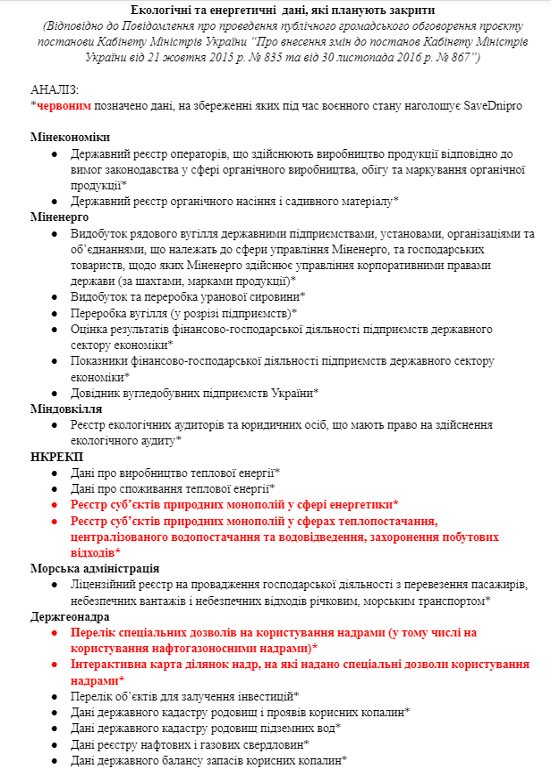
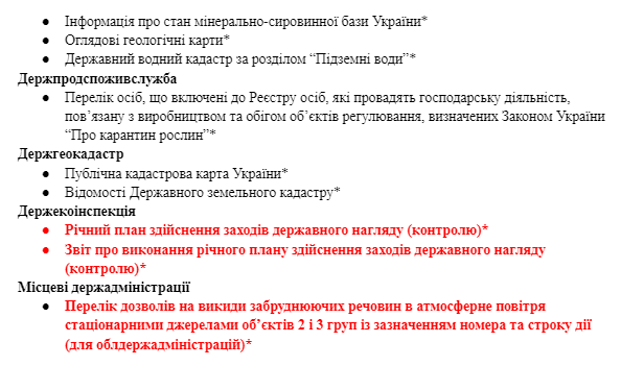
Environmental and energy open data that is planned to be closed
Why is this important?
Ukraine aspired to become one of the three world leaders in terms of the level of development of the field of open data in order to build a transparent and accountable state for citizens who use services based on open data, because a strong and active civil society is a guarantee of the protection of rights, freedoms and state integrity, which today is actively shows Ukraine and its people in conditions of military aggression by Russia.
And today, when Ukraine won the right to apply for membership in the EU, we have no right to postpone the course taken for the openness of activity and transparency of the European model. Expanding the list of open environmental data is aimed at improving and streamlining decisions, bringing Ukrainian legislation into line with European Union law, and fulfilling Ukraine's obligations under the Association Agreement in the area of providing access to environmental information.
In this difficult transition period, one should not forget the importance of continuous monitoring of all processes where a corruption component may appear. Example, a list of permits for emissions of pollutants into atmospheric air by stationary sources of objects of groups 2 and 3 with an indication of the number and period of validity is information managed by local state administrations, and therefore, after closing access to it, any unscrupulous economic entity will be able not to publish its emission permits (or prohibition) at all. Public access to this data is a guarantee of transparency in the process of obtaining permits and compliance by all parties with their obligations.
Conclusion
Therefore, open ecological data do not contradict the requirements of wartime, and their openness is a critical condition, in particular, for the possibility of restoring the liberated territories and for maintaining a safe life in the larger territory of the country. But the closure of most ecodata will definitely create corruption risks, which were already numerous in the environmental field. This will certainly not bring us closer to EU membership.


